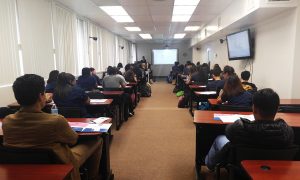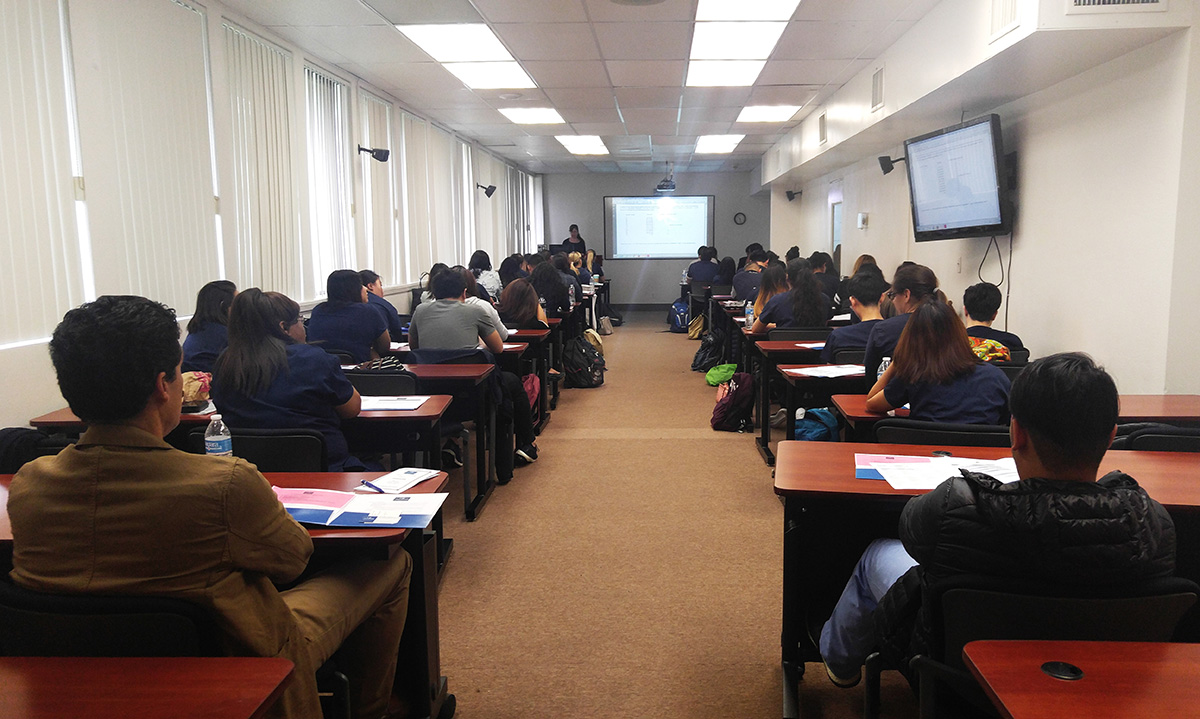
50 students attend the Spring 2017 Nursing Orientation on Monday, March 20, 2017.
American University of Health Sciences welcomed 50 students to its School of Nursing (SON) Program in the Spring 2017 Orientation on Monday, March 20, 2017. Dr. Cheryl Padgham, AUHS’ Assistant Dean of School of Nursing, welcomed incoming students to the university and gave them an in-depth presentation about the SON program, academic integrity, and the institution’s mission and culture.
“We want you (incoming nursing students) to be committed to learning,” Dr. Padgham said, “Your nursing faculty is fully committed to teaching you to become excellent nurses but you have to be just as committed to learn.”
Dr. Padgham explained how the students must maintain a 2.5 GPA (grade point average) to remain in the SON program. If a student’s GPA falls below 2.5, he or she will be placed on academic probation.
“You will have the following quarter to bring your GPA up,” Dr. Padgham said, “But we will provide you with a lot of resources that will help you. You will not be alone in that process.”
A student’s grades are “as is,” meaning their final grades will not be rounded up or down.
“If you get a 77.5-percent grade then you do not pass the course because that grade will not be rounded up. The grade is the grade,” she said.
Nursing students are only allowed to fail then retake one course throughout the entirety of the SON Program. Two failures result in dismissal from the program.
“If you fail one course then you have to pass that course the next time around. But you can only fail once for the entire program,” said Dr. Padgham, “If you fail a second course throughout your program here, then you are out of the SON program. So you must be successful for every course.”
She then discussed the terms for withdrawing from classes.
“Just like in any other university and in any other major, you have the ability to withdraw from a class,” Dr. Padgham said, “When you withdraw, you will get a ‘W’ for that course. Then you can come back the next time the class is taught and you can retake it.”
Students have until the 7th week of school to withdraw from their courses. However, students cannot withdraw from a course because of failing grades.
“Obviously, there are extenuating circumstances. If something unfortunate happens and you have no choice but to withdraw from a class, then speak with your clinical faculty,” Dr. Padgham said, “Communication is very important.”
Incoming students were then given an overview of the classes they were required to take.“The first course that you will be taking is the physical assessment class and the physical assessment lab. These are two separate courses but they are ‘linked,’ meaning that what you learn in the class, you will then apply in the lab,” Dr. Padgham said, “You will have multiple courses where you will have a theory class that is linked to a clinical course. You must pass both the theory course and the clinical course in order to advance in the program.”
If a student passed a theory class but did not pass the clinical rotation linked to said theory class, then the student cannot move on to the next course. The student must retake both the theory class and the clinical course again because they are linked.
AUHS nursing students are expected to behave professionally in both the classroom and on clinical sites.
“AUHS has a code of ethics and a code of conduct. The university uses the same code of ethics as professional nurses,” said Dr. Padgham, “Professional behavior means that you are here on time, you speak kindly to one another, and you do not fight or argue in the hallways. We want you to treat each other civilly.”
Dr. Padgham emphasized the importance of academic integrity.
“If you see cheating, collusion, or plagiarism, you are to report it,” she said, “If we, as registered nurses (RN), see another RN who is treating a patient unsafely, it is your ethical duty to report it to your supervisor. The same thing happens in a university setting.”
Dr. Padgham explained to the students that each professor or faculty member in the SON program is different and will ultimately decide what will and will not be allowed in their classroom.
“Some faculty will let you record their lectures but some will not. Some faculty will allow you to use your laptop during class but some faculty will not,” Dr. Padgham said, “Each faculty member has charge of their classroom.”
The students were advised not to use their cellphones while they are in a classroom or clinical site.
“The one thing that will drive any faculty crazy is if you are using your cellphone. Also, if you are in a clinical area and you take your cellphone out, a lot of the nurses on the floor will think you are texting a friend,” she said.
Dr. Padgham acknowledged that students today have “awesome apps” on their cellphones such as drug apps and access to textbooks. But not all nurses and professors will understand what students are doing on their phones so it is best to not use their cellular devices unless they are instructed to do otherwise. She went on to discuss the essential functions of a student nurse in a clinical setting.
“You must be able to communicate, think critically, listen to instructions, and have fine motor abilities,” Dr. Padgham said, “You are going to be on your feet for 12-hour shift so you will be moving, lifting and turning a lot.”
Dr. Padgham informed the students of the university’s skills lab where they could practice taking blood pressure, IV starts, and more.
“We have an awesome skills lab, so use it! We encourage you to go in and practice what you learned in class,” she said, “But when you’re in the skills lab, you have to follow the rules- no food, no drink, etc. You can use the equipment that is available in the lab as long as you put it away when you are done.”
Dr. Padgham asked the students to be courteous to their fellow peers and SON faculty by keeping the skills lab as clean as possible.
“I always say that when you use the skills lab, you are going to leave it cleaner and tidier than when you came in,” Dr. Padgham said, “Leaving a mess in the skills lab is completely inappropriate and unprofessional, so please clean up after yourselves. If you find a piece of equipment that is not working, please let the faculty know so that we can get it repaired.”
Dr. Padgham also discussed how students would be graded in their clinicals.
“The clinical faculty will be with you in the skills lab and on clinical sites,” she said, “In your clinical courses, you do not get a letter grade. Your grade is either a pass or fail.”
Dr. Padgham gave the students some advice regarding their clinical rotations.
“You need to be on time, be in your uniform, and have all the equipment you need for that clinical site,” Dr. Padgham said, “Clinical instructors will send you home if you are late, if you do not have your appropriate uniform, and if you do not have your appropriate equipment. You do not want to be sent home because that is considered an absence.”
Being on time is vital in clinical rotations, according to Dr. Padgham.
“For those of you that end up with a 2-hour commute, give yourself enough time to get there. I tell my kids, “If you’re early, then you’re on time. If you’re on time, then you’re late. If you’re late, then just forget it,’” Dr. Padgham said, “Being on time is part of being a professional. Think about it. When you’re working as an RN, do you always want to be 10 minutes late? No, you’re going to get fired. That is why we are building that in you right now. Be on time.”
American University of Health Sciences (AUHS) is a private, for-profit, minority owned, minority serving, Christian-based university whose mission is to educate and equip students with life careers and to produce quality health care professionals for the community, the nation, and the world. It is a university where appreciation of life and one’s spiritual reason for existence can be nurtured. AUHS offers a Bachelor of Science in Nursing (BSN), a Bachelor of Science in Pharmaceutical Sciences (BSPS) and a Master of Science in Clinical Research (MSCR). To request more information, email admissions@auhs.edu or call (562) 988-2278. For the latest news, pictures and videos of American University of Health Sciences’ events, like us on Facebook @auhs.edu and follow us on Twitter @AUHS_Campus and Instagram @auhsedu.

